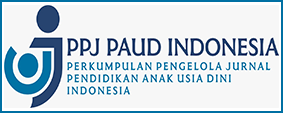THE INFLUENCE OF WORKING MOTHERS' PARENTING PATTERNS ON EARLY CHILDHOOD INDEPENDENCE
Abstract
In the current era of globalization, the demands for needs in family life are increasing, thus making mothers play a dual role in the household. This will indirectly affect the care of working mothers towards early childhood independence. This research was aimed to know the effect of working mother’s parenting on independence of children aged 5 to 6 years old. This research used a quantitative research type with survey method. Research sample was taken with used purposive sampling namely a working mother out of home and a mother who have children aged 5 to 6 years old many as 57 respondents. The data collection tools used are questionnaire on parenting of working mother’s and self-reliance questionnaire for children aged 5-6 years old. Data analysis in this research used a simple linier regression test. The result of this research showed that there is an influence between the parenting of working mother’s amd the independence of children aged 5-6 years old with the value of F count is 13.968 and the contribution of the positive influence is 20.3 percent. Suggestions for government policies and structured parenting programs to improve early childhood independence in working mothers' families.
Kata Kunci: pola asuh, kemadirian, ibu bekerja, anak usia dini.
Keywords
Full Text:
PDFReferences
Al-khoury, P., Zein, D. C., & Saade, R. (2018). Is the Children Cgpa Affected By Working Mothers: Across Sectional Study of Students in Lebanese Universities. Archives of Business Research, 6(6), 333–338. https://doi.org/10.14738/abr.66.3060
Baumrind, Diana. (2004). Macam-macam Pola Asuh Orang Tua. Yayasan Obor Indonesia, Jakarta.
Castle, K. (2004). The meaning of autonomy in early childhood teacher education. Journal of Early Childhood Teacher Education, 25(1), 3–10. https://doi.org/10.1080/1090102040250103
Dewi, S. A. T., Raisa, S. E., Utami, S. R., Simanjuntak, M., & Riany, Y. E. (2022). Working Mother’s Experience with School-Age Children during the Covid-19 Pandemic. Journal of Family Sciences, 1–16. https://doi.org/10.29244/jfs.vi.36575
Geofanny, R. (2016). Perbedaan Kemandirian Anak Usia Dini Ditinjau Dari Ibu Bekerja dan Ibu Tidak Bekerja. Psikoborneo: Jurnal Ilmiah Psikologi, 4(4), 464–470. https://doi.org/10.30872/psikoborneo.v4i4.4230
Handayani, F., Ardianti, S. D., & Kuryanto, M. S. (2021). Korelasi Pola Asuh Otoriter Terhadap Hasil Belajar Pada Kelas V Sd 4 Piji Dawe Kudus. Jurnal Prasasti Ilmu, 1(1). https://doi.org/10.24176/jpi.v1i1.6074
Hess, S., & Pollmann-Schult, M. (2020). Associations between Mothers’ Work-Family Conflict and Children’s Psychological Well-being: The Mediating Role of Mothers’ Parenting Behavior. Journal of Child and Family Studies, 29(6), 1561–1571. https://doi.org/10.1007/s10826-019-01669-1
Manimekalai, K., Post, S., Fellow, D., & Geetha, S. (2019). Working mothers and parenting: health status inIndia. International Journal of Applied Research, 5(9), 168–173. www.allresearchjournal.com
Mariyam, M., & Apisah, A. (2008). Hubungan Antara Status Pekerjaan Ibu dan Kemandirian Anak Usia Prasekolah di Desa Prapag Lor Kecamatan Losari Kabupaten Brebes. FIKKES: Jurnal Keperawatan, 2(1), 16–23.
Matias, M., Ferreira, T., & Matos, P. M. (2022). “Don’t Bring Work Home”: How Career Orientation Moderates Permeable Parenting Boundaries in Dual-earner Couples. Journal of Child and Family Studies. https://doi.org/10.1007/s10826-022-02290-5
Miller, K. E., & Riley, J. (2022). Changed Landscape, Unchanged Norms: Work-Family Conflict and the Persistence of the Academic Mother Ideal. Innovative Higher Education, 47(3), 471–492. https://doi.org/10.1007/s10755-021-09586-2
Nasucha, A., Indriawati, P., & Nuraini, T. (2019). Perbedaan Kemandirian Anak Usia Pra Sekolah Ditinjau Dari Ibu Bekerja Dan Ibu Rumah Tangga Di Sekolah Alam Jabalussalam Balikpapan Tahun Ajaran 2017/2018. Jurnal Edueco, 2(1), 1–4. https://doi.org/10.36277/edueco.v2i1.27
Orellana, L., Schnettler, B., Miranda-Zapata, E., Poblete, H., Lobos, G., Lapo, M., & Adasme-Berríos, C. (2021). Effects of Work-to-Family Conflict and Work Interference in the Parent-Child Relationship on Family Satisfaction of Dual-Earner Parents and their Adolescent Children. Child Indicators Research, 14(6), 2145–2169. https://doi.org/10.1007/s12187-021-09822-3
River, L. M., Borelli, J. L., & Nelson-Coffey, S. K. (2019). Tolerance of Infant Distress Among Working Parents: Examining the Roles of Attachment Anxiety and Work–Family Conflict. Parenting, 19(1–2), 137–159. https://doi.org/10.1080/15295192.2019.1556023
Rizkyani, F., Adriany, V., & Syaodih, E. (2019). Kemandirian Anak Usia Dini Menurut Pandangan Guru Dan Orang Tua. Edukid, 16(2), 121–129. https://doi.org/10.17509/edukid.v16i2.19805
Rutherford, H. J. V., Booth, C. R., Luyten, P., Bridgett, D. J., & Mayes, L. C. (2015). Investigating the association between parental reflective functioning and distress tolerance in motherhood. Infant Behavior and Development, 40, 54–63. https://doi.org/10.1016/j.infbeh.2015.04.005
Rutherford, M. B. (2009). Children’s Autonomy and Responsibility: An Analysis of Childrearing Advice. Qualitative Sociology, 32(4), 337–353. https://doi.org/10.1007/s11133-009-9136-2
Salina, E., Thamrin, M., & Sutarmanto. (2014). Faktor-Faktor Penyebab Anak Menjadi Tidak Mandiri Pada Usia 5-6 Tahun Di Raudatul Athfal Babussalam. Jurnal Pendidikan Dan Pembelajaran, 3(6), 1–10.
Sari, N., Rini, R., & Irzalinda, V. (2019). Kelekatan pada Ibu dengan Kemandirian Anak Usia 5-6 Tahun. Indonesian Journal of Early Childhood Issues, 2(1).
Schieman, S., Ruppanner, L., & Milkie, M. A. (2018). Who Helps with Homework? Parenting Inequality and Relationship Quality Among Employed Mothers and Fathers. Journal of Family and Economic Issues, 39(1), 49–65. https://doi.org/10.1007/s10834-017-9545-4
Smetana, J. G. (2017). Current research on parenting styles, dimensions, and beliefs. Current Opinion in Psychology, 15(16), 19–25. https://doi.org/10.1016/j.copsyc.2017.02.012
Sofia, A., & Adiyanti, M. A. (2014). Hubungan pola asuh otoritatif orangtua dan konformitas teman sebaya terhadap kecerdasan moral. Jurnal Pendidikan Progresif, 4(2), 133–141.
Utami, C. H. (2016). Hubungan Pola Asuh Autoritatif Dengan Kemandirian Anak TK di Banjararum Kalibawang Kulon Progo. Jurnal Pendidikan Anak Usia Dini, 9, 904–917.
Yamin, Sanan. (2010). Panduan Pendidikan Anak Usia Dini. Gaung Persada Press, Jakarta.
Young, R., & Tully, M. (2022). Autonomy vs. control: Associations among parental mediation, perceived parenting styles, and U. S. adolescents’ risky online experiences. Cyberpsychology: Journal of Psychosocial Research on Cyberspace, 16(2), Article 5. https://doi.org/10.5817/CP2022-2-5
Zabaleta, O. G., & Peres-Izaguirre, E. (2022). The development of student autonomy in Spain over the last 10 years: a review. Educational Review. https://doi.org/https://doi.org/10.1080/00131911.2021.1987389
DOI: https://doi.org/10.36706/jtk.v10i1.20446
Refbacks
- There are currently no refbacks.
Copyright (c) 2023 Tumbuh Kembang: Kajian Teori dan Pembelajaran PAUD

This work is licensed under a Creative Commons Attribution-ShareAlike 4.0 International License.
Jurnal Tumbuh Kembang : Kajian Teori dan Pembelajaran PAUD
published by PG-PAUD FKIP, Universitas Sriwijaya, Palembang, Indonesia.
Jalan Srijaya Kampus FKIP KM 5,5, Palembang
Jalan Palembang-Prabumulih Km 32 Indralaya, Ogan Ilir.
email : jtk@fkip.unsri.ac.id dan mahyumi@fkip.unsri.ac.id
P-ISSN:2355-7443
E-ISSN: 2657-0785








